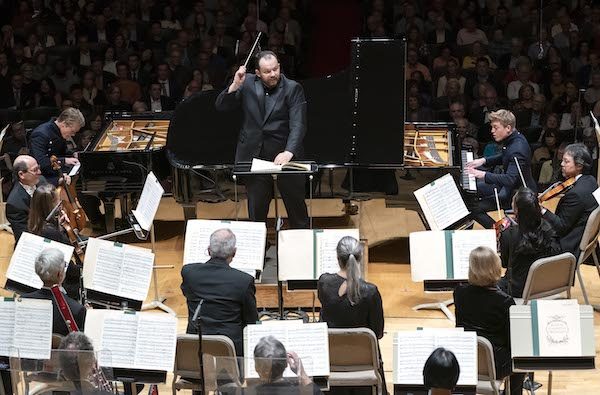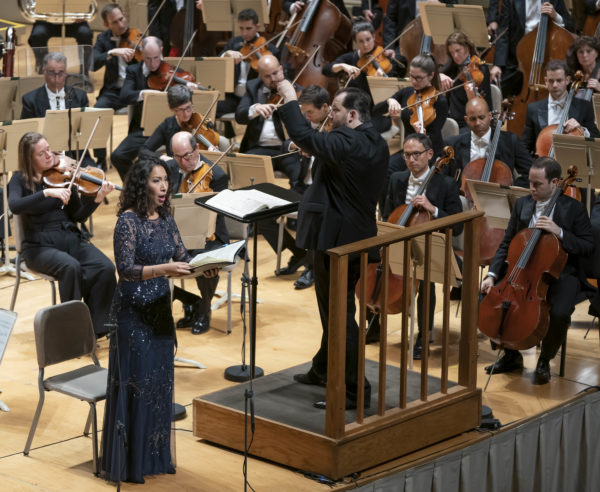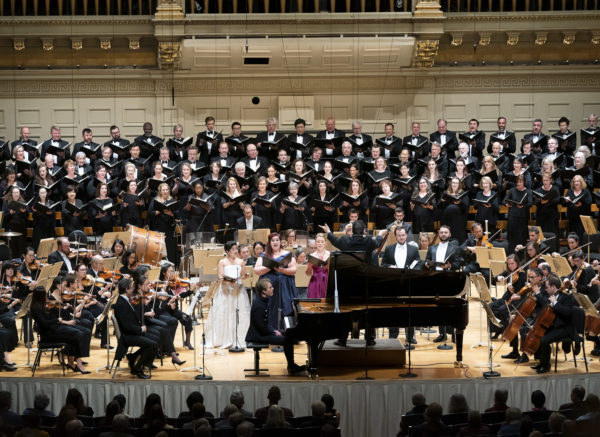Concert Review: Boston Symphony Orchestra’s Opening Night
By Jonathan Blumhofer
That rarest of Opening Nights: a program that was mostly fun and entertaining, but also substantive and artistically satisfying.

Pianists Arthur and Lucas Jussen with Andris Nelsons and the BSO in the Poulenc Double Piano Concerto. Photo: Winslow Townson.
The Boston Symphony Orchestra’s (BSO) 2019–20 season began Thursday with that rarest of Opening Nights: a program that was mostly fun and entertaining, but also substantive and artistically satisfying. It paired music by Francis Poulenc – the Concerto for Two Pianos and Gloria – with Beethoven’s Choral Fantasy and a new piece by Eric Nathan.
Nathan’s contribution, his Concerto for Orchestra, provided the night’s expressive anchor.
An 18-minute-long essay for large orchestra, the work falls into three parts. The first is basically slow, alternating heaving, microtonally tinged writing for brass instruments with lyrical statements for woodwinds and strings. Eventually, the tempo picks up and a vigorous, contrapuntal section ensues. This, in turn, is followed by a lengthy coda in which chorale-like lines emerge out of the strings’ sustained unison pitches.
Throughout, the music’s mood is somber and reflective, while Nathan’s scoring is colorful and fully idiomatic.
It’s always tricky making sense of a new piece on its first hearing. On Thursday, there were some edgy moments within the ensemble – early entrances, seemingly cracked notes, and the like. To these ears, the coda overstayed its welcome and the piece would benefit from an expansion of the bustling central part.
But the overall impression the Concerto left was a positive one. Nathan’s a gifted composer with a fine ear for color and a strong sense of musical structure. What’s more, he’s got a technical arsenal that’s hard to beat and he knows how to employ it without being off-putting. That’s a potent skill set.
Above all, he writes meaningful, expressive music.
Ultimately, due to its duration, content, and form, the Concerto struck me as less of a showpiece than a serious musical argument in the spirit of the great, 20th-century American symphonic tradition. That’s an overlooked body of work, to be sure, but a formidable one, all the same. Semantic distinctions aside, it’s wonderful to see a 35-year-old composer stepping so confidently into the line of Barber, Copland, Thomson, Harris, and, more recently, Albert, Rouse, and Stucky.
Andris Nelsons led the BSO in a crackling performance that was, perhaps, a bit rough around the edges, but still marked by nuance in the score’s songful moments, power (in its stentorian ones), and rhythmic energy (throughout).
Those same qualities were evident, more or less, in the remainder of the evening’s offerings.
After the Nathan, the BSO and Tanglewood Festival Chorus (TFC) turned in a rounded, vibrant account of Poulenc’s Gloria. A Koussevitzky Foundation commission premiered by the orchestra in 1961, it hasn’t been played by them at Symphony Hall since, shockingly, 1987.
Let’s just say it’s good to have the piece back in the repertoire.

Soprano Nicole Cabell sings Poulenc’s “Gloria” with the BSO. Photo: Winslow Townson.
Thursday’s performance found the TFC in excellent form, singing with robust sound, precise rhythm, and terrific diction: every syllable of the text was cleanly enunciated. They blended pleasingly, too, with soprano Nicole Cabell, whose plush tone seemed tailor-fit to Poulenc’s soaring solo writing.
Nelsons kept things moving nicely and characterfully. The melodic line was never lost in the proceedings, though this wasn’t a reading that paid Poulenc’s meltingly colorful scoring short shrift: the oboe and bassoon solos in “Domine Deus” were beautifully executed, the playful instrumental refrains of “Domine fili unigenite” danced, and the sour chords that start the finale offered plenty of tangy bite.
Vigor and vim were the primary qualities on display, too, in Poulenc’s Concerto for Two Pianos.
Thursday’s reading featured brothers Lucas and Arthur Jussen as soloists and, as one might expect from a couple of 20-somethings, theirs was a performance that totally fit the piece: fresh, brash, and thoroughly engaging.
Tempos tended to be swift. The first movement’s opening motto was plenty brisk while the principal melody of the “Larghetto” moved smartly. In the finale, the dueling toccatas lacked nothing for spunk. Indeed, the solo playing was, throughout, rhythmically taut and evenly balanced: shared phrases and gestures were passed off with the utmost fluency.
The BSO ably matched the Jussen brothers’ rhythmic panache and, aside from some overly enthusiastic drumming in the first movement, managed an accompaniment that was carefully balanced and delicately shaded.

The BSO performs Beethoven’s Choral Fantasy with the Tanglewood Festival Chorus, pianist Arthur Jussen, and vocal soloists. Photo: Winslow Townson.
Balances were also good in the Beethoven Choral Fantasy that came right before intermission. A weird, occasional piece for piano, six vocal soloists, choir, and orchestra, the Fantasy fit Thursday’s celebratory program perfectly.
True, Arthur Jussen proved a less-than-persuasive Beethoven keyboardist in it: the notes were mostly in hand, but they lacked an underlying fire and sense of Beethovenian character.
Still, the singing from the TFC was mighty, and the night’s soloists – drawn from the ranks of recent Tanglewood Music Center fellows – more than held their own. Particularly impressive was silver-voiced soprano Alexandra Smither.
Nelsons drew playing of sweep and grandeur from the BSO. The sequence of accumulating orchestral solos (one flute, two oboes, two clarinets and bassoon, etc.) in the middle was vividly done, while the final chorus – a hymn to the transformative powers of art – rang out exuberantly.
Jonathan Blumhofer is a composer and violist who has been active in the greater Boston area since 2004. His music has received numerous awards and been performed by various ensembles, including the American Composers Orchestra, Kiev Philharmonic, Camerata Chicago, Xanthos Ensemble, and Juventas New Music Group. Since receiving his doctorate from Boston University in 2010, Jon has taught at Clark University, Worcester Polytechnic Institute, and online for the University of Phoenix, in addition to writing music criticism for the Worcester Telegram & Gazette.
